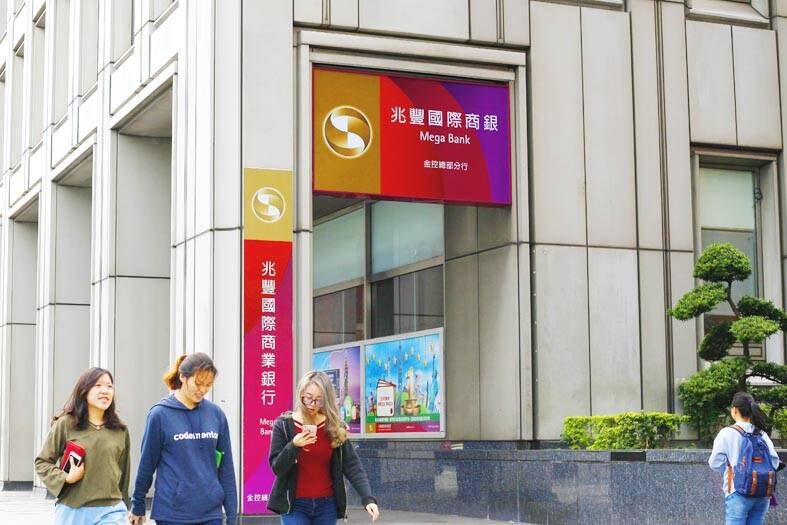State-run Mega Financial Holding Co (兆豐金控) has proposed issuing a dividend of NT$1.32 per share based on last year’s profits, despite hefty unrealized losses in bond and securities holdings.
The dividend proposal, which needs to be approved in a shareholders’ meeting on June 16, would comprise NT$1.24 in cash and NT$0.08 in stock, Mega Financial said on Monday.
The company distributed NT$1.65 in dividends last year — NT$1.45 in cash and NT$0.2 in stock.

Photo: Ritchie B. Tong, EPA-EFE
This year’s proposed NT$1.32 dividend is equivalent to last year’s earnings per share, translating into a payout ratio of 100 percent, higher than the 80 to 87 percent in the previous four years.
The company’s net profit last year fell 28.8 percent year-on-year to NT$18.34 billion (US$600.8 million), as its insurance unit posted NT$9.52 billion in losses due to COVID-19 insurance claims, while its brokerage unit’s profit dropped 78.1 percent to NT$600 million amid volatility on financial markets.
Mega Financial president David Hu (胡光華) last month told an investors’ conference that the company would distribute a dividend at a level similar to last year’s by using more than NT$100 billion in retained earnings and statutory reserves collected over the past few years.
The company’s unrealized losses of NT$15.33 billion had as of late last month eased from three months earlier, as financial markets have somewhat recovered from upheavals caused by global inflation and monetary tightening.
The dividend policy reflects the banking-focused firm’s improving bottom line this year, after first-quarter net profit hit NT$10.78 billion, the best quarterly performance in the company’s history, with earnings per share of NT$0.77.
In related news, Mega Financial chairman Michael Chang (張兆順) is to step down after board elections this year. The government plans to fill the vacancy with Taiwan Cooperative Financial Holding Co (合庫金控) chairman Lei Chung-dar (雷仲達), Chinese-language media reported over the weekend, citing unnamed sources.

RUN IT BACK: A succesful first project working with hyperscalers to design chips encouraged MediaTek to start a second project, aiming to hit stride in 2028 MediaTek Inc (聯發科), the world’s biggest smartphone chip supplier, yesterday said it is engaging a second hyperscaler to help design artificial intelligence (AI) accelerators used in data centers following a similar project expected to generate revenue streams soon. The first AI accelerator project is to bring in US$1 billion revenue next year and several billion US dollars more in 2027, MediaTek chief executive officer Rick Tsai (蔡力行) told a virtual investor conference yesterday. The second AI accelerator project is expected to contribute to revenue beginning in 2028, Tsai said. MediaTek yesterday raised its revenue forecast for the global AI accelerator used

Taiwan Semiconductor Manufacturing Co (TSMC, 台積電) has secured three construction permits for its plan to build a state-of-the-art A14 wafer fab in Taichung, and is likely to start construction soon, the Central Taiwan Science Park Bureau said yesterday. Speaking with CNA, Wang Chun-chieh (王俊傑), deputy director general of the science park bureau, said the world’s largest contract chipmaker has received three construction permits — one to build a fab to roll out sophisticated chips, another to build a central utility plant to provide water and electricity for the facility and the other to build three office buildings. With the three permits, TSMC

TEMPORARY TRUCE: China has made concessions to ease rare earth trade controls, among others, while Washington holds fire on a 100% tariff on all Chinese goods China is effectively suspending implementation of additional export controls on rare earth metals and terminating investigations targeting US companies in the semiconductor supply chain, the White House announced. The White House on Saturday issued a fact sheet outlining some details of the trade pact agreed to earlier in the week by US President Donald Trump and Chinese President Xi Jinping (習近平) that aimed to ease tensions between the world’s two largest economies. Under the deal, China is to issue general licenses valid for exports of rare earths, gallium, germanium, antimony and graphite “for the benefit of US end users and their suppliers

Dutch chipmaker Nexperia BV’s China unit yesterday said that it had established sufficient inventories of finished goods and works-in-progress, and that its supply chain remained secure and stable after its parent halted wafer supplies. The Dutch company suspended supplies of wafers to its Chinese assembly plant a week ago, calling it “a direct consequence of the local management’s recent failure to comply with the agreed contractual payment terms,” Reuters reported on Friday last week. Its China unit called Nexperia’s suspension “unilateral” and “extremely irresponsible,” adding that the Dutch parent’s claim about contractual payment was “misleading and highly deceptive,” according to a statement